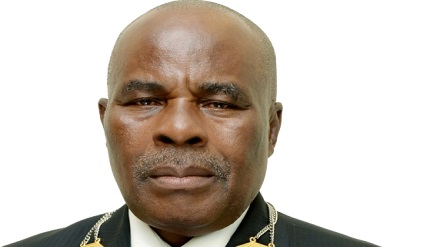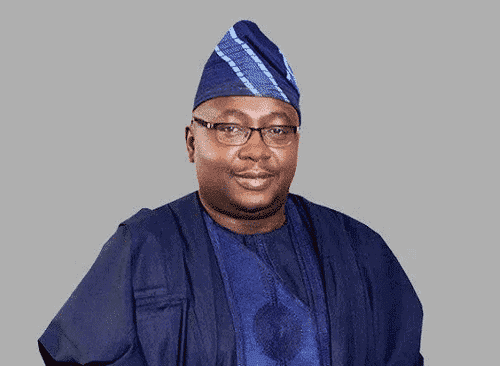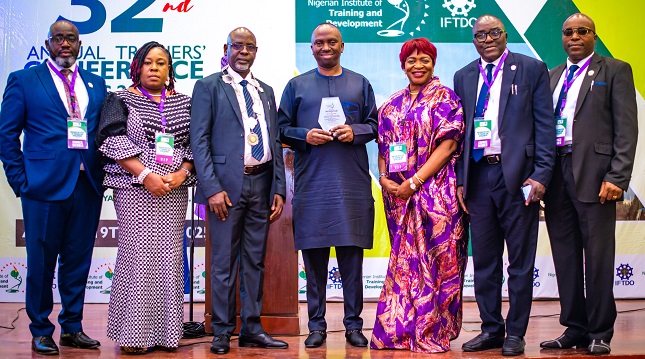News
NCS Bemoans Unproductive Consumption, Digital Exclusion

In reflections on 2014 and aspirations for 2015, the Nigeria Computer Society (NCS), has decried the persisting climate of unproductive consumption and digital exclusion in the Nigerian society.
According to NCS, although the IT Industry and Profession, in 2014, witnessed increased presence of IT in various sectors of the economy and society, however, a significant challenge is the persisting climate of unproductive consumption and digital exclusion in rural/urban, gender, among other trajectories.
In this light, Nigeria Computer Society (NCS), the nation’s foremost network of IT practitioners and stakeholders, said that it will be organizing its 12th international conference in July, 2015 based on the theme “Information Technology for Inclusive Development”.
Speaking on ssing IT to address Nigeria’s developmental challenges and strengthening the local IT sector, Professor David Adewumi, president of NCS, said these are strategic initiatives for global competitiveness.
He declared that 2015 is the year of Innovative and Inclusive Development, “in line with NCS’s advocacy role of ensuring that the nation receives the very best in processes, technologies and people”.
The telecommunications industry, he continued, still witnessed tremendous growth, while attracting investment in 2014. “However, while teledensity has improved significantly, quality of service, affordability, broadband penetration and last mile connectivity to the consumer are barriers that need to be addressed in 2015. The National Broadband Plan, if faithfully implemented, appears promising. The Nigerian Communications Commission (NCC) in particular has a major role to play and needs to speed up process of licensing of Infrastructure Companies (InfraCos) that will rollout broadband infrastructure nationwide. Also there must be bite in the Smart States initiative”.
To address some of the challenges, he said that a solid foundation in education is required to lead the IT revolution.
Adewumi said, “Just as in previous years, quite a few private, social and governmental initiatives in capacity building for IT were undertaken in 2014 to close the IT skills gap.
“However, human capital in IT is still massively below requirements, especially in research. Though there is improved access in education, there is an urgent need to ensure the entire education system embraces the 21st century knowledge culture that promotes and supports innovation.
NCS also gave Analyses on issues bugging the sector in Nigeria:
Online Sphere:
“The online sphere is home to considerable progress – online stores, business and social networks. Most outstanding in terms of investments attracted, jobs created and societal changes have been the e-payment/e-commerce landscape. In 2015, the space should be widened for existing players and new entrants. In addition, support issues as well as growth in mobile money uptake need to addressed.
Policies:
Policy and advocacy has been an area of growth through the efforts of professional and industry groups such as NCS, ATCON, ISPON, etc. NCS has been extremely fortunate to have members and partners who understand that advocacy efforts require resources.
They supported the IT Research workshops, Scholarship awards, the NCS 2014 conference and the 2014 National IT Merit Award (NITMA) and advocacy organization. In 2015 their continued support will further advance IT development in Nigeria.
The National Information Technology Development Agency (NITDA) and the Federal Ministry of Communication Technology (FMCT) has been coordinating national IT activities, and needs to keep providing visionary leadership in 2015. Multistakeholder policy review and development are essential to ensure policies are relevant and effective. FMCT and NITDA should also as a matter of urgency work with stakeholders to fast track the enactment of draft bills that will accelerate IT development in Nigeria.
Cyberthreats
Greater availability of computing and internet facilities (laptops, PCs, mobile and wireless devices) drives up cyber threats and increased the need for information security. Indeed because of the impact of cyberspace on the nation’s social and economic life, national security now encompasses the digital environment.
It is imperative that stakeholders such as NITDA, the Information Technology Systems and Security Professionals (ITSSP) group of NCS, security agencies and other Infosecurity entities work together to put information security strategies, policies, legislation and culture in place.
Improved overall cybersecurity awareness and capacity should be a national strategic goal in 2015. Better application of IT to fight terrorism and other national security threats, as well as the resolution of the National database issue should also be priority targets in 2015.
Recognition Of IT Professionals
Though quite a number of government agencies are now IT driven, it is disturbing to note that IT professionals are not actively involved at the board level in top level decision making and policy formulation/evaluation for most of such organizations.
The absence of IT professionals on the boards of MDAs questions the nation’s desire to be part of the 21st century. It is pertinent to note that the IT industry and profession was not represented at the 2014 National conference.
Even with improved access to IT and the Internet, activity in the IT space is largely foreign driven and dominated. The prevailing funding and patronage scenario puts the local industry at an extreme disadvantage. The birth of the IT innovation fund is a good start requiring sustainability.
Addressing local content development and IT research and development is a strategic imperative for 2015.
There has been appreciation of knowledge, merit and IT enabled innovation through the national honours platform for IT achievers –the annual National Information Technology Merit Awards (NITMA) and the NITDA e-governance awards held during the 2014 e-Nigeria conference. However, it is quite amazing that despite the manner in which IT is radically reshaping Nigerian society, the yearly composition of the National honours list does not recognize or appreciate the impact IT is making in the country.
Software Development
Software development, entrepreneurship and research initiatives addressing issues of funding and patronage should be encouraged and promoted. FMCT and NITDA must be commended for initiating some remarkable projects with such a focus.
Scaling up of promising interventions require strategic partnerships for faster, sustainable results. Nigerian content development in ICT, youth empowerment, digital gender mainstreaming and research are all top agenda items.
Critical to Nigeria’s digital future is support of innovative ideas in IT and harnessing the potential of Nigeria’s youth. However, in order to better serve the purpose and yield the benefit for which they were established, it is absolutely essential that FMCT, NITDA and NCC do more to support stakeholder driven initiatives in an inclusive manner.
A much needed, in fact overdue, area of critical focus for these government bodies is to work with stakeholders such as NCS to establish IT parks that will facilitate the achievement of identified priorities.
Mobile Technology
Mobile technology should be embraced at all levels to leverage on Nigeria’s improving teledensity for strong growth, financial and digital inclusion and to address Nigeria’s developmental issues.
The mainstreaming of mobile into development will reflect through the development of feasible and sustainable mobile initiatives relating to mobile money, mEducation, mHealth, mAgriculture, etc.
INEC And 2015 Elections
The Independent National Election Commission (INEC) employed information technologies to conduct to conduct governorship elections last year.
INEC is expected to continue in this vein in the conduct of national elections in 2015. It is imperative that the electoral body works more closely with stakeholders such as NCS to enhance IT adoption in election management and processes in Nigeria.
It is about building a prosperous, modern and democratic nation that meets the aspirations of the Nigerian people.
IT For National Development
IT development is a national matter and priority that has immense impact on the future of Nigeria.
The vision, leadership and commitment of key actors in the social, political and economic spheres are desired.
Though there are exceptions, the political class as a whole still appears to underestimate the potential of the IT sector. In view of upcoming elections in 2015, it is absolutely essential that Nigerians support and encourage credible politicians at all levels (local, state and national) that have an appreciation of the glaring need to incorporate and prioritize the role of the ICT sector in all sectors.
Those who must lead at this time must be those who are committed to ensuring the game changing nature and ability of IT is used to drive development.
News
AfDB, Aerosense Ink Agreement to Propel Drone Adoption in Africa

The African Development Bank (AfDB) and Aerosense Inc, a Japanese drone manufacturer, have inked an agreement to expand cooperation and initiatives in drone technology in Africa.

According to the AfDB, representatives from both organisations signed a Letter of Intent late last week on the sidelines of the ninth Tokyo International Conference on African Development in Yokohama, Japan.
The agreement was signed by Solomon Quaynor, AfDB’s vice president for private sector, infrastructure, and industrialisation, and Kohtaro Sabe, Aerosense’s president and CEO.
In June, the AfDB Sustainable Road Maintenance Program for Africa issued a request for proposals, and the company was chosen.
The agreement formalises a relationship of mutual cooperation, assistance, information and knowledge sharing between the two institutions, as well as the exploration of co-financing and deal opportunities and appropriate coordination of actions between them and their respective teams, with a focus on the promotion of sustainable infrastructure solutions in Africa, according to the bank.
In addition, the AfDB will assist collaboration with the public sector, lead awareness-raising initiatives, support capacity building for local partners, and investigate potential debt (and/or equity) financing support for drone deployment projects.
Aerosense will conduct demand studies for drone solutions in specific African markets, as well as technical feasibility studies for drone application, taking into account local geographical factors, and investigate potential deployment options based on positive feasibility study results.
“The program is a bold response to Africa’s growing infrastructure challenges. By partnering with Aerosense, we will not only promote efficient road management but also consider promoting other unique solutions such as disaster management, river/flooding control, agricultural sensing, and medical equipment delivery,” said Quaynor.
For Sabe, the project is about leveraging multinational technological solutions to address African challenges.
He said: “It is a great honour to serve the people in Africa with our Japanese technology for enhancing their quality of life. We are looking forward to collaborating with AfDB to build a better future together in a concrete manner.”
News
Nigeria Taps $190M JICA Loan to Power Underserved Communities

Nigeria is seeking a $190 million renewable energy loan backed by the Japan International Cooperation Agency (JICA), according to Adebayo Adelabu, minister of power.

Minister Adebayo-Adelabu
In a statement released by the ministry on Saturday, Adelabu disclosed the plan during the 9th Tokyo International Conference on African Development (TICAD 9) in Yokohama, Japan, where the Nigerian delegation led by President Bola Tinubu held high-level discussions on power, infrastructure, and industrial transformation.
Adelabu said the facility is aimed at scaling distributed renewable energy solutions across underserved communities. “This builds on the recently launched $750 million World Bank Distributed Access through Renewable Energy Scale-up (DARES) programme under the Mission 300 Compact, which aims to bring clean and reliable electricity to more than 17 million Nigerians,” the ministry said.
The minister also held talks with Japanese corporations including Toshiba, Hitachi, Japan’s transmission and distribution corporation, and energy exchange corporations. Discussions focused on strengthening transmission infrastructure, improving operational efficiency, and cutting system losses.
The ministry said these engagements build on recent Federal Executive Council approvals for counterpart funding of N19.08 billion to unlock a $238 million loan from JICA. The loan will finance the expansion of the national grid, including the construction of over 200km of new 330kV and 132kV double circuit lines, six new substations, and extensions to existing facilities.
Three substations funded through a $32 million JICA grant—located in Apo (FCT), Keffi (Nasarawa), and Apapa (Lagos)—are also set for commissioning, a move expected to boost supply reliability for households, industries, and business hubs, including the Lagos Port.
Speaking during a panel session themed “HICKARE Africa: Harnessing Innovation, Co-creation, and Knowledge for Accessible and Resilient Energy for Africa”, Adelabu highlighted Nigeria’s energy gap, noting that only 55–60 percent of the population currently has access to electricity, much of which is unreliable.
He outlined the government’s approach to expand grid access in urban areas while accelerating off-grid solutions such as solar mini-grids and standalone systems in rural and peri-urban communities. He pointed to challenges including limited access to affordable capital, high costs for rural households, and the under-utilisation of productive-use equipment.
Despite these hurdles, the minister reaffirmed the government’s commitment to reforms through supportive policies, private-sector collaboration, and increased local manufacturing of renewable energy components.
Adelabu commended JICA and the Japanese government for their “long-standing support” to Nigeria’s power sector, praising their contributions to infrastructure, training, technical studies, and financing. He expressed optimism for deeper partnerships between both countries in driving Nigeria’s energy transition.
News
Banigbe, T2 CEO says Nigeria’s Growth Hinges on Learning, Innovation, and Afrocentric Content

Obafemi Banigbe, chief executive officer of T2, has stressed that Nigeria’s long-term economic transformation depends on continuous upskilling, digital learning, and workforce adaptability.

Speaking as Special Guest at the 32nd Annual Trainers’ Conference (ATC 2025) of the Nigerian Institute of Training and Development (NITAD), held recently at the Shehu Musa Yar’Adua Centre, Abuja, Banigbe warned that without deliberate investment in human capital and technology-driven innovation, the nation risks lagging behind in a rapidly evolving global economy.
Drawing from personal reflections, practical insights, and a forward-looking vision, Banigbe urged Nigerians to reimagine approaches to learning, work, and growth in order to build a prosperous, inclusive, and innovation-led society.
He emphasized that the traditional model of “learning once and working forever” is obsolete.
“With Nigeria projected to become the world’s third most populous nation by 2050, and 70 percent of its citizens under 30, the need for continuous upskilling, digital learning, and adaptability is not optional, it is existential,” he stated.
Banigbe underscored the importance of democratizing access to digital tools, ensuring that every Nigerian child has the same opportunities as peers in developed economies.
He called for the creation of Afrocentric educational content, including culturally relevant cartoons, to help children learn science, mathematics, and history through familiar cultural references rather than foreign identities that disconnect them from their environment.
He also urged a national shift away from a culture that prizes certificates and training hours to one that rewards competence, innovation, and problem-solving.
He envisioned a civil service and workforce driven by solutions rather than processes, stressing that while artificial intelligence may analyze and automate, it cannot dream, uphold ethics, or create new nations, a reminder of the enduring human advantage.
Banigbe further encouraged adoption of cost-effective training models such as online platforms, virtual cohorts, and open-source learning, while acknowledging the continued value of global exposure where local resources fall short.
During an interactive question and answer session, he addressed concerns around affordability, accessibility, and the role of self-driven digital education in shaping Nigeria’s future-ready workforce.
He assured participants that T2 itself is on a path of transformation, committed to delivering world-class services as a proudly Nigerian brand.
In recognition of his contribution to national dialogue and thought leadership, the President of NITAD, James Bulus, presented Banigbe with an Award of Excellence.

 E-Financial3 days ago
E-Financial3 days agoFBNQuest Merchant Bank Facilitates Landmark ₦5Bn Commercial Paper Programme for Accion Microfinance Bank

 E-Business3 days ago
E-Business3 days agoNDPC Begins Probe of Banks, Others for Data Breaches

 Telecom3 days ago
Telecom3 days agoDigital Realty Commits to Africa’s Digital Transformation @ Launch of LKK2 Data Center

 E-Financial3 days ago
E-Financial3 days agoUBA to Deepen Financial Inclusion, Boost Savings’ Culture with Super Savers’ Promo

 Telecom3 days ago
Telecom3 days agoIntel–U.S. Partnership Reshapes Semiconductor Landscape with Historic Equity Agreement

 E-Financial3 days ago
E-Financial3 days agoFidelity Bank Resumes Intl Transactions on Naira Debit Cards

 E-Financial3 days ago
E-Financial3 days agoNigeria Leads Africa in Stablecoin Adoption with $22Bn in Transactions

 Telecom3 days ago
Telecom3 days agoNITDA Alerts Nigerians to eSIM Security Flaw Deployed to Hijack Devices Worldwide

























